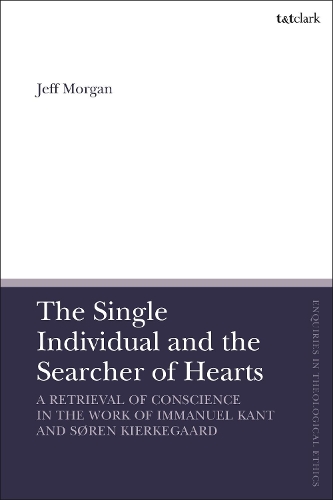
The Single Individual and the Searcher of Hearts: A Retrieval of Conscience in the Work of Immanuel Kant and Sren Kierkegaard
(Hardback)
Available Formats
Publishing Details
The Single Individual and the Searcher of Hearts: A Retrieval of Conscience in the Work of Immanuel Kant and Sren Kierkegaard
By (Author) Jeff Morgan
Bloomsbury Publishing PLC
T.& T.Clark Ltd
6th August 2020
United Kingdom
Classifications
Professional and Scholarly
Non Fiction
Theology
Religious ethics
241
Physical Properties
Hardback
192
Width 156mm, Height 234mm
449g
Description
Jeff Morgan argues that both Immanuel Kant and Sren Kierkegaard think of conscience as an individuals moral self-awareness before God, specifically before the claim God makes on each person. This innovative reading corrects prevailing views that both figures, especially Kant, lay the groundwork for the autonomous individual of modern life that is, the atomistic individual who is accountable chiefly to themselves as their own lawmaker. This book first challenges the dismissal of conscience in 20th-century Christian ethics, often in favour of an emphasis on corporate life and corporate self-understanding. Morgan shows that this dismissal is based on a misinterpretation of Immanuel Kants practical philosophy and moral theology, and of Sren Kierkegaards second authorship. He does this with refreshing discussions of Stanley Hauerwas, Oliver ODonovan, and other major figures. Morgan instead situates Kant and Kierkegaard within a broad trajectory in Christian thought in which an individuals moral self-awareness before God, as distinct from moral self-awareness before a community, is an essential feature of the Christian moral life.
Reviews
I welcome and would like to commend this contribution. There is much in Jeff Morgans book to appreciate ... The book will appeal and is accessible to scholars and lay-readers alike. * Studies in Christian Ethics *
Resisting dominant contemporary conceptions of conscience as either the infallible voice of God within or the internalization of communal norms, Jeff Morgan retrieves from Kant and Kierkegaard a fresh notion of conscience as the site of personal accountability to God. However critical the role of the community is in mediating Gods presence, personal accountability to God may never be collapsed into accountability to the church or any other community. Morgans study offers a vital reminder that the pathologies of the modern self-asserting subject cannot be healed through fideistic recourse to communal authority. * Jennifer A. Herdt, Yale Divinity School, USA *
This lucid and thought-provoking study rehabilitates a conception of conscience that should never have been dismissed and shows why its recovery is vital to the moral life and the life of faith. The splendid readings of Kant and Kierkegaard, the incisive criticisms of their detractors, and the patient yet insistent case for the necessity of conscientious self-examination before God make this a compelling read. If we are now witnessing a recovery of conscience as a central topic in theological ethics, this book is poised to lead the way. I wholeheartedly (and conscientiously!) recommend it. * Gerald McKenny, University of Notre Dame, USA *
Author Bio
Jeff Morgan is Assistant Professor of Theology and Ethics at Saint Josephs College of Maine, USA.
